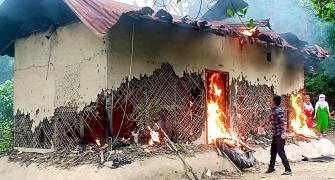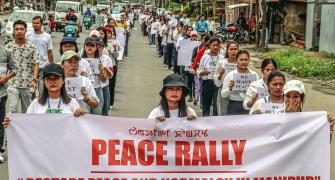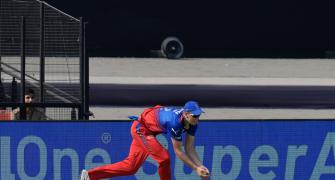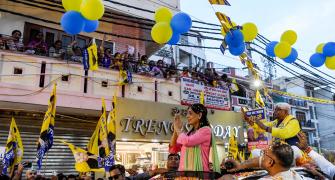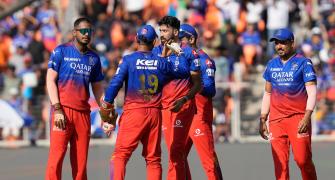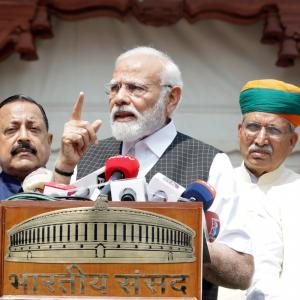By comparing I.N.D.IA. with banned terror outfits, Modi has exhibited the kind of nervousness never ever associated with him even at the height of the Gujarat riots, and certainly since his prime ministerial days, observes N Sathiya Moorthy.

If the Opposition 'I.N.D.IA.-cited' reason for their moving a no-trust motion against the incumbent government is right, then it is a sad commentary on the current state of democracy in the country.
Even there, it is only customary for the prime minister to respond to their charges before the Lok Sabha votes on their no-trust motion.
It is not mandatory, and some other minister could well respond in his place -- if Modi wanted to take the current deadlock further and also farther from democratic precedents of the kind.
As they concede at the very outset, the Opposition has moved the no-trust motion even while they do not stand a chance in a house where the government leads 334-142, with 62 Lok Sabha members from 10 different parties remaining non-committal at present -- not that even their wholesale support for the motion would change its fate.
What may change could be the electoral fate of some of these parties, which too have a substantial following among the minorities.
The Manipur issue, which is the only provocation for the no-trust motion having consolidated the minorities especially against the ruling BJP-NDA, voting with the government or even abstaining from the vote could well send out a wrong message to these constituencies in the respective states.
Or, so seems to be the second reason for the Opposition strategy. In their reckoning, the 'I.N.D.IA. alliance stands to gain electorally in these states.
The Congress will be the chief beneficiary in most cases, but the depth and width of such support may vary from state to state, party to party.
As coincidence would have it, many of these 'non-committed' parties and MPs are placed in south India.
Of the total of 62 only 14 are from outside the region, which includes OdisHa.
The remaining 48 are considered 'Congress seats' by other parties in the Opposition alliance, and that is saying something -- but nothing anywhere close to declaring the party the victor in any or all of them just now.
The list of 'neutrals' at present comprise the TDP (3) from Andhra Pradesh, ruling TRS/BRS in Telangana (9) and, yes, the Muslim-exclusive AIMM (2), also from the state and which the Opposition for long has been dubbing as the BJP's 'B-Team' or stooge.
Then, of course, there is the ruling BJD in OdisHa with nine Lok Sabha members, whose leader and Chief Minister Navin Patnaik has done the balancing act very effectively through his five terms as chief minister.
Among the rest, there is the BSP with nine Lok Sabha members from UP, Akali Dal (2) and Akali Dal-Mann (2) from Punjab, apart from the AIUDF from Assam with one seat.

The break-up would show why the Congress and also the ruling BJP at the Centre are keen on 'fixing' these cat-on-the-wall parties, one way or the other -- though that is not their real or even main motive behind moving this no-trust vote.
In a way, the south Indian parties jumping on to the Opposition bandwagon would be difficult for the Congress as the party hopes to revive its chances, especially in the footsteps of wresting power from the BJP rival in Karnataka.
It is another matter if the party aligns itself as a junior partner (though not a 'sub-junior') with the ruling parties in these states, but if and if only there is a facilitator, and also willingness on the party of the Congress high command and state leaderships to play along.
For the BJP, it needs to figure out early as to their election-time alignment, if any, before going after them, one way or the other.
The chances are these regional parties may take their call only post-poll, yet, in terms of vote, their decision on the no-trust vote may matter the most for the Congress, hence the Opposition alliance.

It is yet anybody's guess why Modi and the ruling BJP allowed the 'Manipur wound' to fester when they could have through the agencies of the Centre doused the flames early on.
Possibly, they had not bargained for the social media post of two women being paraded naked, that too making its presence on the very eve of the Monsoon session of Parliament.
There is no use for the BJP and its sympathisers to cry wolf, and blame it all on drug industry, China or even the Christian West as some of Modi bhakts had done in the earlier rounds, forgetting the close proximity that the PM has built in his relations with US President Joe Biden and French counterpart, Emmanuel Macron, even as Manipur raged.
The fact is that someone seemed to have taken charge of the unfocussed and at times untrained Opposition attacks on the government, especially since the Modi avalanche swept them away in elections 2014.
It is not saying a lot yet, but this used to be the way that authenticated media leaks on the government's alleged wrong-doings used to appear in newspapers on the eve of Parliament session, or on the very morning either house was discussing the budgetary allocation for individual ministries.

At the end of it, by comparing I.N.D.IA. with banned terror outfits, Modi has only exhibited the kind of nervousness never ever associated with him, even at the height of the Gujarat riots, and certainly since his prime ministerial days.
The question in the minds of the average BJP cadre is if Modiji, sitting where he is, is seeing more than what the others have no way of knowing about.
What more, more and more Modi supporters who are otherwise apolitical seem to be coming around to look at the leader minus his ideological baggage.
It does not mean that they are going to vote against Modi and the BJP, but a constant repeat of Manipur-like episodes and continued indifference, if not collusion, of the ruling BJP, as they see it, could make these voters to stay at home on polling day.
In a way, another 'surgical strike' may not do the trick.
After all, they are familiar with the coincidences of the Karnataka hijab ban issue at the height of the UP assembly election campaign, and now the Manipur riots when Karnataka was polling.
For the record, barring price rise and employment, people do not vote on the same issue twice.
Otherwise, the whole nation would not have wiped out the anti-Congress Opposition in elections 1984 in the aftermath of the Indira Gandhi assassination and the electoral impact restricted to native UP and action-scene Tamil Nadu following the Rajiv Gandhi assassination (1991).
Yet, the voters ignored terrorism as an election issue in elections 1998, when the Coimbatore serial blasts against then BJP boss L K Advani did not create as much ripples even in Tamil Nadu, where it happened.
In that election, for the first time for a losing alliance, the ruling DMK-TMC combine crossed the double-digit mark for the 40 Lok Sabha seats, including the Union territory of Puducherry.
The Opposition AIADMK-BJP combine bagged the majority 30 seats, which was five or more fewer than the usual 'winner's tally', which on occasions as the Indira Gandhi and Rajiv Gandhi assassinations had produced a 40-nil score.
It was equally so in elections 1996 against the first Jaya government and the second one in 2004.
Both owed not only to governmental corruption and high-handedness, but more so to the kind of alliance that then DMK boss M Karunanidhi could stitch.
And the story is true of the rest of the country, too, until the Modi magic rewrote all election strategies and calculations of the kind.
Possibly not any more, or that is what the PM's unbecoming attack on I.N.D.I.A. alliance has conveyed to his hardened supporters, but those that are not his ideological brethren from a shared past.
Maybe, it is time the BJP too look itself in the mirror, and remade itself than reapplying the same old makeup that has begun peeling at the periphery.
N Sathiya Moorthy, veteran journalist and author, is a Chennai-based policy analyst and political commentator.
Feature Presentation: Aslam Hunani/Rediff.com

